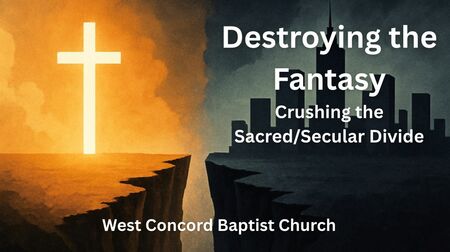
1 Corinthians 10:23-33
The Principle of Sacred Liberty (vv. 23-24)
- Liberty’s reality
- Liberty’s range
- Liberty’s root (Psalm 24)
The Exercise of Sacred Liberty (vv. 25-30)
- A clear conscience
- A careful compassion
- A considered conduct
The Goal of Sacred Liberty (vv. 31-33)
- The glory of God
- The gospel of Christ
More to Consider
"Why should my strong conscience be judged by a brother's weak conscience? And what damage can there be in meat for which I have given thanks?" The answer is: regardless of what we do, be it eating or drinking, we must do it for God's glory and not just to please ourselves. Humanly speaking, it may seem wrong for a strong Christian to bow to a weaker brother, but this is what glorifies God.
Making that weaker brother stumble into sin would disgrace the church and the name of Christ.
There are only three groups of people in the world: the Jews, the Gentiles, and the church. God expects the church to seek to win Jews and Gentiles to the Lord. If a Christian lives to win souls, these questions about conduct will take care of themselves. It is the idle Christian, the carnal Christian, who frets over how far he can get involved with the world. When believers live to build the church and win the lost, they put first things first and glorify the name of Christ.
Warren W. Wiersbe
The principle which summarized Paul’s response to the question of eating food offered as a pagan sacrifice was an application of the command to love God and neighbors. Christian behavior should be for the glory of God. Also it should build up the church of God by leading some to new birth (v. 33b) and others to maturity in the process of salvation (justification, sanctification, glorification; cf. 1:30). Christians should avoid behavior that would cause others—whether Jews (cf. 9:20), Greeks (cf. 9:21), or the church of God … to stumble (lit., “fall”; cf. 10:12).
Lowery, D. K. (1985). 1 Corinthians. In J. F. Walvoord & R. B. Zuck (Eds.), The Bible Knowledge Commentary: An Exposition of the Scriptures (Vol. 2, p. 528). Victor Books.
A man's worst difficulties begin when he is able to do as he likes.
Thoman Huxley, "Address on University Education," Collected Essays, 1902, III, 236.

